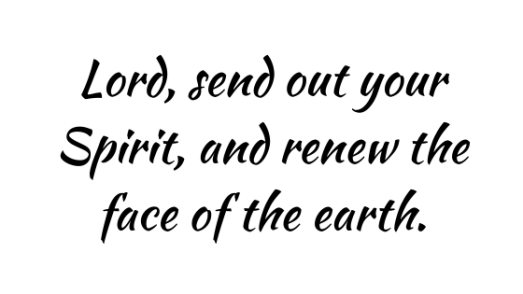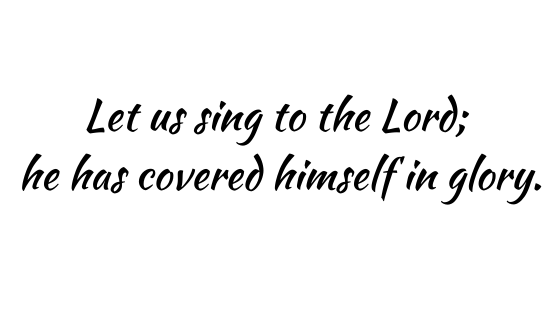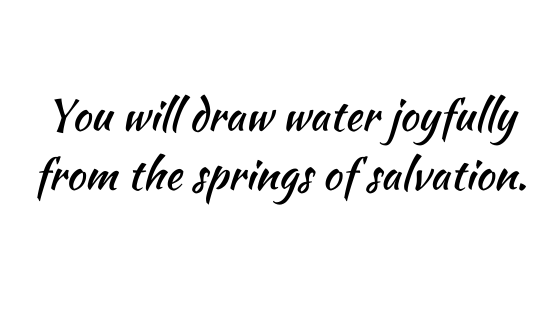Introduction
The “response” aspect of a responsorial psalm is the reflection of the assembly on the proclamation of the reading which just took place. Hence, each Old Testament reading in the Easter Vigil liturgy has a corresponding psalm.
Psalm 104: 1-2, 5-6, 10, 12-14, 24, 35
The first responsorial psalm is from Psalm 104, a nature hymn praising God who easily and skillfully made rampaging waters and primordial night into a world vibrant with life. It is one of the most beautiful psalms in the entire Psalter. This corresponds perfectly with the creation account found in this evening’s first reading.
Bless the LORD, O my soul!
The passage begins with a self-summons to sing the praises of God.
O LORD, my God, you are great indeed! You are clothed with majesty and glory, robed in light as with a cloak.
The psalmist is overwhelmed by the splendor of the universe and is brimming with praise for the creator of such grandeur. In fact, this awesome experience of creation is itself a revelation of God.
Light was the first thing that God created; here, God wears it as a glorious robe.
To behold creation is to encounter God.
You fixed the earth upon its foundation, not to be moved forever; with the ocean, as with a garment, you covered it; above the mountains the waters stood.
Of all the creation motifs found in this psalm, the most prominent is water. The earth itself was established amidst cosmic water and then covered with protective ocean water as with a garment.
You send forth springs into the watercourses that wind among the mountains. Beside them the birds of heaven dwell; from among the branches they send forth their song.
The psalmist uses highly poetry to describe how God, using springs and rain, relieves the thirst of wild animals, provides food for flocks and mankind, and causes trees to grow.
You water the mountains from your palace; the earth is replete with the fruit of your works. You raise grass for the cattle, and vegetation for man’s use, producing bread from the earth.
Although water was initially chaotic and threatening, through God’s gracious act of creation water has become the indispensable source of life for all living creatures.
How manifold are your works, O LORD! In wisdom you have wrought them all — the earth is full of your creatures. Bless the LORD, O my soul!
The creation narrative and this psalm response both underscore the fact of God’s activity. None of this happens haphazardly, nor is there any struggle between God and the forces of nature. All of nature serves the designs of God.
In fact, in the psalm it is God who acts through nature; God sends the springs and raises the grass. God has created these marvels and then words through them for the benefit of all.
No wonder the psalmist is inspired by creation to sing the praises of the Creator!
Psalm 16: 5, 8-11
Our second responsorial psalm is from Psalm 16, a psalm that speaks of the covenant relationship with God and the confidence that abounds from it.
O LORD, my allotted portion
The psalmist employs two images to represent the covenant relationship: the allotted portion and the cup.
The allotted portion of land is the inheritance that each tribe was given and which was handed down within the tribe generation after generation. This land provided the people with identity and membership, sustenance and prosperity. Without land they had no future, and they would not last long in the present. By invoking this image, the psalmist is claiming that God has replaced the land in the religious consciousness of the people; the blessings and promises customarily associated with land are now associated with the LORD.
and my cup, you it is who hold fast my lot.
The second image is the cup. This might be the communal cup passed around from which all drank. Such an action solidified the union of those who drank from the common cup. When this action took place at a cultic meal, those participating in the feast were joined not only to each other but to the deity as well. By invoking this image, the psalmist declares that this unifying cup is really the LORD. In other words, the psalmist is joined so closely with God as almost to defy separation.
I set the LORD ever before me; with him at my right hand I shall not be disturbed.
Those who devote themselves fully to God have him as their constant guide, their protector, their joy and well-being.
Therefore my heart is glad and my soul rejoices, my body, too, abides in confidence;
Such protection is reason for profound rejoicing. Regardless of the terrifying, even life-threatening ordeals the psalmist must endure, God is steadfast.
because you will not abandon my soul to the netherworld, nor will you suffer your faithful one to undergo corruption.
The Hebrew term shahath means here the pit, a synonym for Sheol, the underworld. The Greek translation derives the word here and elsewhere from the verb shahath, “to be corrupt.”
In the Septuagint Greek, this verse is interpreted as being set free from the corruption of the grave after death; in other words, they are taken to refer to the resurrection.
The apostles shared this interpretation, as a reference to the resurrection of Christ, arguing that if these are King David’s words (as all the psalms were thought to be) and David was dead, then this verse must refer to someone else, that is, Jesus. (See Acts 2:29-3:31; cf. Acts 13:35.)
You will show me the path to life, fullness of joys in your presence, the delights at your right hand forever.
In the face of things, this kind of confidence in God may appear to be foolhardy, but the psalmist’s trust is unshakable. Ultimately the “fullness of joys” will abound in the presence of God.
Saint Teresa of Avila expressed this psalm’s idea very beautifully when she wrote: “He who has God wants for nothing. God alone is enough” (Poems, 30).
Exodus 15: 1-6, 17-18
Our third responsorial is a victory anthem called the Song of Miriam. It is a hymn of thanksgiving for deliverance and guidance that appears in Exodus just after the miracle at the sea.
Along with the victory anthem of Deborah (Judges 5), this is one of the oldest compositions in the Bible, probably dating back as far as the 13th century BC. It celebrates God’s saving power, having miraculously delivered the people from their enemies, and ultimately leading them to the promised land.
I will sing to the LORD, for he is gloriously triumphant;
The poet’s first intention is to give glory to God and to triumph in his triumphs.
horse and chariot he has cast into the sea.
This is less a description of violence and destruction than of deliverance of a favored people.
My strength and my courage is the LORD, and he has been my savior. He is my God, I praise him; the God of my father, I extol him. The LORD is a warrior, LORD is his name!
The characterizations of God underscore the focus on thanksgiving, rather than celebrating the destruction of Israel’s enemies. They all represent some kind of relationship with the people:
- God is a savior;
- God is a patron who guided and protected the ancestors;
- God is a warrior who conquered cosmic evil;
- God is a divine ruler who reigns forever and ever.
Pharaoh’s chariots and army he hurled into the sea; the elite of his officers were submerged in the Red Sea.
The traditional translation of the Hebrew term yam suph is “Red Sea,” but the term actually means “Sea of Reeds” or “reedy sea.” The location is uncertain, though in view of the route taken by the Israelites from Egypt to Sinai, it could not have been what we know today as the Red Sea, which is too far south. It was probably a smaller body of water south of the Gulf of Suez. The term occurs also in Exodus at 10:19; 13:18; and 23:31.
The flood waters covered them, they sank into the depths like a stone.
Almighty God commands the chaotic waters of the sea. Israel’s enemy sinks to the bottom under the weight of their own guilt and God’s wrath.
Your right hand, O LORD, magnificent in power, your right hand, O LORD, has shattered the enemy.
Lest there be any misunderstanding, the poet makes it very clear that it was God who has accomplished this; Israel is the helpless beneficiary of his power.
Faith in God, according to the Bible, is not something theoretical or based on philosophical reasoning; it something practical and based on experience: one believes in God because one has experienced his powerful protection, one knows that God alone saves in a loving way.
You brought in the people you redeemed and planted them on the mountain of your inheritance the place where you made your seat, O LORD, the sanctuary, LORD, which your hands established.
There is an explicit cultic dimension to this hymn. It contains a threefold mention of the sanctuary: the mountain of God’s inheritance; the place of God’s throne; and the sanctuary itself.
This sacred place was important because it was the spot where the people offered sacrifice to God. More than this, it was the privileged place on earth where God dwelt in the midst of the people. It was usually erected on that site believed to be the center of the universe, the place where heaven, earth, and the underworld met. The poet is here thanking God for deliverance, but also for God’s perpetual presence among the people. The presence is important because it will ensure God’s continued protection.
The LORD shall reign forever and ever.
Like God himself, his reign is eternal, and not subject to change. There is great comfort in this for God’s people: not only does he reign universally and with sovereignty, but he will reign eternally. There shall be no end of his dominion.
Psalm 30: 2, 4-6, 11-13
Our fourth responsorial psalm is from Psalm 30, a psalm of thanksgiving for deliverance from the peril of death, the netherworld, the pit.
I will extol you, O LORD, for you drew me clear and did not let my enemies rejoice over me. O LORD, you brought me up from the netherworld; you preserved me from among those going down into the pit.
The psalmist has been delivered from some kind of near-death experience. It might have been illness, depression, or any serious misfortune that can threaten life itself. Whatever it might have been, the danger is now past; God intervened and saved the petitioner.
The word translated as “netherworld” is Sheol, the shadowy underworld residence of the spirits of the dead, here used as a metaphor for near-death.
In addition to the actual calamity, the psalmist was also concerned with enemies who would take delight in the misfortune. God preserved the psalmist from this insult as well.
Sing praise to the LORD, you his faithful ones, and give thanks to his holy name.
The psalmist next turns to the congregation of believers and calls on them to praise God.
For his anger lasts but a moment; a lifetime, his good will. At nightfall, weeping enters in, but with the dawn, rejoicing.
The prayer’s range of focus is extended by noticing how God acts: his favor far exceeds his anger.
Hear, O LORD, and have pity on me; O LORD, be my helper.
The psalmist turns again in prayer to God, pleading for mercy (“have pity on me”) and for grace to help in his time of need (“be my helper”).
You changed my mourning into dancing; O LORD, my God, forever will I give you thanks.
In due time, God delivered the psalmist out of his troubles and restored him to his former prosperity; his prayers were answered. Regardless of the nature of or reason for the misfortune, God can be trusted to come to the aid of one who cries for help.
The image of his mourning being turned into dancing reflects a change in the external expression (probably in a liturgical context) of his inward state. He is now experiencing the joy that accompanies praise.
For this, the psalmist pledges, he will be forever grateful.
We proclaim this psalm tonight in response to the reading of Isaiah 54:5-14, which tells of the consolation and rescue of Jerusalem after God had momentarily abandoned it. In this context, the psalm reveals its prophetic meaning: it proclaims what God did when he raised Jesus Christ after he tasted death.
Isaiah 12: 2-6
(May also be used after the 7th reading, when baptism is not celebrated)
Although it is a passage from the prophetic material, our fifth responsorial is really a hymn of thanksgiving that anticipates favors that will be granted and enjoyed in the future. Therefore, one might consider it a hymn of confidence as well.
God indeed is my savior; I am confident and unafraid. My strength and my courage is the LORD, and he has been my savior.
God is declared “savior,” and because he is the source of salvation, the author is unafraid and filled with courage.
With joy you will draw water at the fountain of salvation.
As with the reading from Isaiah that precedes this responsorial, a theme of water appears. Though the imagery is slightly different, in both cases the water is transformative. Whereas earlier it represented new creation, here it is water of salvation.
Those who draw this water as if from a well will be refreshed by God’s salvific power.
Give thanks to the LORD, acclaim his name; among the nations make known his deeds, proclaim how exalted is his name.
The theme of witness recurs here as well. The writer calls on the community to praise the glorious name of God, the name that represents the very character of God. They are to extol the marvels that God has accomplished and proclaim them to the nations.
Sing praise to the LORD for his glorious achievement; let this be known throughout all the earth.
The most celebrated of these wondrous works is the transformation of the people themselves. Only God could have taken a people in need of salvation and transformed them into witnesses of God’s power. In other words, the transformed lives of God’s people will announce to the nations the marvels God has accomplished.
Shout with exultation, O city of Zion, for great in your midst is the Holy One of Israel!
The third and final theme found in this response highlights the importance of Jerusalem. This city was both the royal capital of the David dynasty and the site where the temple was built. The latter aspect is the focus here.
The city itself is called upon to rejoice, and the reason for this exaltation is the presence of God in its midst. Although the temple was the concrete representation of God’s own divine presence, it is this presence and not the temple building that is fundamental (see Jeremiah 7:3-4).
The theology of the passage has come full circle: The presence of God in the midst of the people is the source of the writer’s confidence in future deliverance.
The title “Holy One of Israel” has cultic nuances. It comes from the Hebrew that means “set apart” or “consecrate” (qādash) and is opposed to what is secular or profane. God’s holiness usually manifested in some form of glory or majesty, and this frequently, though not always, occurs in the Temple. In the presence of such a God, human beings recognize their own limitation and commit themselves to a way of life that separates them from the profane, consecrates them to God, and gives them access to what is holy.
Chosen by God from among the other nations, Israel was set apart and consecrated to God. In this passage, the author calls the people to rejoice in this: the holy God is in their midst.
Psalm 19:8-11
Although the general theme of Psalm 19 is praise, its tone is didactic and exhortative. It describes the blessings that acceptance of the law can impart. It does this not merely to describe the law but also to persuade the people to embrace it as the will of God and to live in accord with it.
When most people today talk about law, they normally mean legal enactments that have some degree of binding force. While this is certainly one dimension of the meaning of the Hebrew word, tôrâ might be better translated as “instruction” or “teaching.” As found in the Bible, the law consisted of directives for living a full and god-fearing life.
The law of the LORD is perfect, refreshing the soul;
Each of the statements in this psalm identifies the law as belonging to the Lord. This is not just any religious law; it is uniquely Israel’s, because in a very specific way it represents the will of the God of Israel.
If the law is understood as the will of God for human beings, then the qualities enshrined in that law could legitimately be considered reflections of divine attributes. If the law is thought to be that point where an encounter with God takes place, then those who are shaped by the law will be godlike.
The qualities associated with the law found in this psalm are some of the most highly prized attributes in any tradition. The law is perfect, or complete; it is trustworthy, upright, and clear; it is pure and true. Fidelity to the law should lead one to the godliness that is enshrined within it.
the decree of the LORD is trustworthy, giving wisdom to the simple.
The enumerated effects of the law are all relational, enhancing human life itself. The law imbues the soul with new vitality; it gives wisdom to those who would not ordinarily have it.
The precepts of the LORD are right, rejoicing the heart;
The law delights the heart.
the command of the LORD is clear, enlightening the eye.
The law enables the eyes to see dimensions of truth otherwise obscured.
The fear of the LORD is pure, enduring forever;
The law establishes an enduring attitude of awe. This is taken as part of the law, insofar as it commands man to honor and respect God.
the ordinances of the LORD are true, all of them just.
The law is a path to righteousness.
Note how the psalm outlines the various forms of the law (law, precepts, commandments, ordinances), the qualities associated with them (perfection, reliability, purity, etc.), and the benefits they bestow on humanity (life, wisdom, joy, light, etc.).
The psalmist is teaching that the law is life-giving and not restrictive, ennobling and not demeaning. Reverence for the law seems to promise the best that life has to offer.
They are more precious than gold, than a heap of purest gold;
Gold is precious not only for its own sake but also for the use to which it can be put. In like manner, as the word of God, the law has its own intrinsic value. However, as the psalm demonstrates, its worth is also found in its ability to accomplish the listed effects.
sweeter also than syrup or honey from the comb.
In its purest state, the sweetness of honey delights the palate. As a sweetening agent, it can completely change the taste of food. Similarly, as the word of God, the law is to be savored for its own sake, but it also provides a particular flavor to everything within its influence.
The law of the Lord is something greatly to be desired.
Psalm 42: 3,5 & 43:3-4
(When baptism is celebrated)
Psalms 42 and 43 really constitute one song, so they are often linked together. Combined, they form a single lament of three sections, each section ending in an identical refrain. The psalmist is far from Jerusalem and longs for the divine presence that Israel experienced in the Temple liturgy.
The context of this lament could be exile, making this a fitting response to the preceding reading from Ezekiel.
Athirst is my soul for God, the living God. When shall I go and behold the face of God?
The psalmist expresses his desire to encounter God in the form of a lament. His thirst is a profoundly spiritual thirst, probably a desire for worship in the temple.
One’s “face” designates a personal presence (Genesis 33:10; Exodus 10:28–29; 2 Samuel 17:11). The expressions “see God/God’s face” occur elsewhere (Psalms 11:7; 17:15; Exodus 24:10; 33:7–11; Job 33:26) for the presence of God in the Temple.
I went with the throng and led them in procession to the house of God, amid loud cries of joy and thanksgiving, with the multitude keeping festival.
The psalmist recalls happier days when he used to go up to the temple and there enjoy the company of the Lord.
Notice the liturgical imagery: procession to the house of God, keeping festival. It seems that the psalmist even exercised some form of leadership within the worshipping community, leading the procession.
Send forth your light and your fidelity; they shall lead me on and bring me to your holy mountain, to your dwelling-place.
“Light” and “fidelity” are a pair of divine attributes personified as guides for the pilgrimage. The psalmist is experiencing a kind of darkness, and prays that God’s light and fidelity will guide lead him back to Jerusalem and ultimately to God’s presence in the Temple.
Despite the suffering that is evident, there is no despair. The psalmist confidently anticipates standing in God’s presence.
Then will I go in to the altar of God, the God of my gladness and joy; then will I give you thanks upon the harp, O God, my God!
These last verses resemble a prophetic announcement. It is a confident expectation, cast in future form. The grief and lament of the opening verses have given way to gladness and rejoicing. God has heard and answered the prayer of the psalmist.
Psalm 51: 12-15, 18-19
(When baptism is not celebrated)
Our seventh responsorial psalm when baptism is not celebrated comes from Psalm 51, the best known of the seven Penitential Psalms (the others are Psalms 6, 32, 38, 102, 130, and 143). This Christian designation dates from the 7th century AD for psalms suitable to express repentance.
Although it is considered a lament, it also contains elements of a confession and prayer for forgiveness. Christians often use this psalm to pray for God’s forgiveness and petition him for inner renewal by the Holy Spirit.
A clean heart create for me, O God, and a steadfast spirit renew within me.
The passage opens with a plea for restoration. The clean heart and new spirit spoken of here correspond to the same themes in the prophetic reading from Ezekiel it is responding to.
The technical term for “create” (bārā’) is used, indicating that the psalmist is asking for a radical inner transformation by way of God’s transcendent power as Creator of the universe.
Cast me not out from your presence, and your Holy Spirit take not from me. Give me back the joy of your salvation, and a willing spirit sustain in me.
The prayer is cast in negative terms as well: do not cast me from your presence, do not take your Spirit from me. Instead, restore the joy of salvation that I forfeited, and instill in me a spirit that will freely accept the responsibilities of this new relationship.
Having previously rebelled and violated the covenant bond, the psalmist now begs for the restoration of his intimate connection with God.
I will teach transgressors your ways, and sinners shall return to you.
The psalmist promises to announce to other sinners the salvation of God. Gratitude for having been forgiven becomes active service to others, who will see the new life of the psalmist and be inspired to also return to God.
For you are not pleased with sacrifices; should I offer a holocaust, you would not accept it.
The interior nature of this transformation can also be seen in the character of worship that flows from it. External performance, regardless of how faithfully it is done, is not enough. The psalmist goes so far as to say that God is not even pleased with practices of worship. This may sound exaggerated, but it is in keeping with the theme of inner transformation so prominent in the prophetic reading and psalm response.
My sacrifice, O God, is a contrite spirit; a heart contrite and humbled, O God, you will not spurn.
Once again heart and spirit are the focus of the psalmist’s attention. The clean heart is now also a humble heart; the steadfast spirit is now also contrite.
The inner renewal effected by God is now complete.
Psalm 118: 1-2, 16-17, 22-23
Our final responsorial psalm comes from Psalm 118, a song in praise of God’s power and victory. We use it in our Easter Vigil liturgy to proclaim and celebrate the new order of salvation that has been established by the resurrection of Christ.
Give thanks to the LORD, for he is good, for his mercy endures forever.
Let the house of Israel say, “His mercy endures forever.”
The refrain “his mercy endures forever” indicates that this thanksgiving psalm was intended for congregational singing.
The Hebrew word for mercy (hesed) is a technical theological term denoting God’s steadfast love for God’s covenant partners, the chosen people of Israel. The psalmist maintains that such love will last forever. This is indeed reason to give thanks!
The right hand of the LORD has struck with power; the right hand of the LORD is exalted.
God is depicted as a mighty warrior whose strong hand prevails over forces that can threaten the life of the psalmist. God’s goodness and mercy toward the house of Israel are seen in this victory.
The right side of a person was considered the stronger side, the honorable side. The image of God’s right hand connotes strength and triumph. It suggests that God’s victory was won in a righteous manner.
I shall not die, but live, and declare the works of the LORD.
There seems to be a personal element in this victory. In the wake of God’s triumph, the psalmist himself has been spared from death. As a result, he extols God’s good favor, becoming a witness to the grandeur of the saving works of the LORD.
The stone the builders rejected has become the cornerstone.
The final image is the metaphor of reversal of fortunes, found so often in religious literature. The situation is always the same: A righteous person is rejected, sometimes even persecuted, by other members of the community. When God steps in to correct this unjust situation, the righteous one is not only vindicated but is also elevated to a position of great importance.
In this psalm, the stone that was rejected becomes the very foundation of the entire building. It’s not clear to whom this metaphor of the cornerstone refers. However, as the verses of this psalm are arranged for our liturgical use, it seems that the speaker who survived the threat of death is the referent. This salvation was brought about by God, and it is recognized as a marvel for which to give praise and thanks.
The New Testament interprets this verse as referring to the death and resurrection of Christ (Matthew 21:42; Acts 4:11). Jesus was rejected by the Jewish authorities but ultimately became the cornerstone of God’s saving power, so that “there is no other name under heaven given among men by which we must be saved” (Acts 4:12).
By the LORD has this been done; it is wonderful in our eyes.
Throughout this account of suffering and salvation, it’s very clear that deliverance and exaltation are the works of God and not the accomplishments of human beings. This saving act may have happened to an individual, but the entire congregation has witnessed it and marvels at it.
The redemption at the hand of the LORD leaves us in awe.








